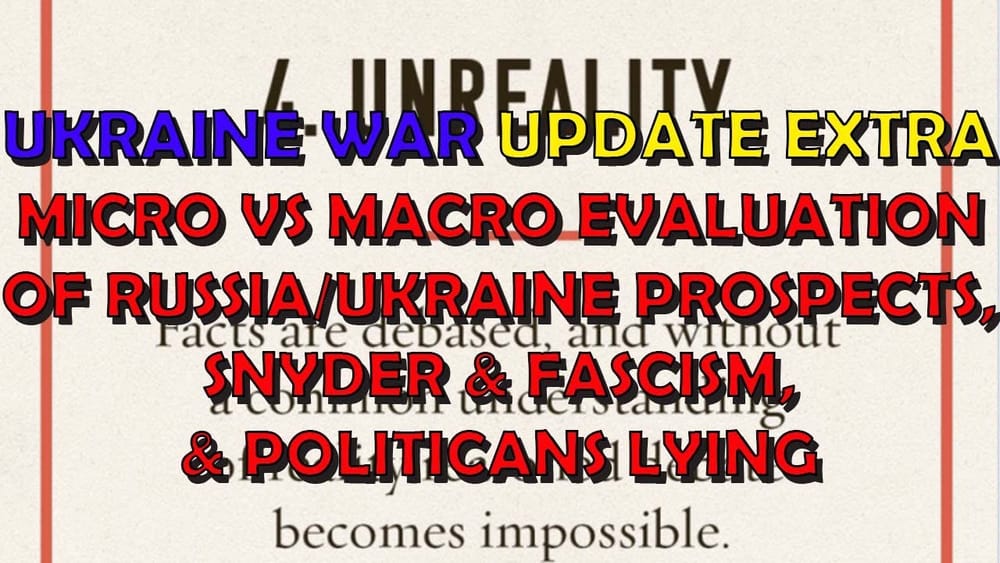Ukraine War Upd. EXTRA: Macro vs Micro Evaluation, Snyder & Fascism, & Lying Politicians
Table of Contents 📖
"If you do not know what you face, you do not know how to act."
Hello Team
🎦 00:00-01:14⏩
Jonathan welcomes viewers to a late-night Ukraine War Update Extra video, explaining that it's being released later than usual due to his son's football tournament. He mentions that the video will be split into two parts: the first covering recent comments from Andrew Perpetua, and the second featuring a section about Timothy Snyder and fascism that was cut from a previous video.
Return to top⤴️
Andrew Perpetua: The Importance of Balancing Optimism and Realism
🎦 01:14-02:51⏩
Jonathan discusses Andrew Perpetua's recent observations about the war in Ukraine, highlighting Perpetua's point that excessive optimism about Ukraine's position has backfired. He agrees with Perpetua's assessment that the conflict is a war of attrition that will continue to inflict heavy casualties on both sides.
Return to top⤴️
The Problem with One-Sided Reporting
🎦 02:51-05:37⏩
Jonathan expands on Perpetua's points by drawing attention to the dangers of relying solely on Ukrainian sources for information, using the example of a New York Times article about Ukrainian troops crossing the Dnipro River that focused on the hardships faced by Ukrainian soldiers without providing the Russian perspective. He suggests that the situation for Russian forces may be even worse.
Return to top⤴️
Russia's Equipment Shortages and Difficult Decisions
🎦 05:37-09:07⏩
Jonathan delves further into the issue of attrition, arguing that Russia may already be facing critical equipment shortages. He points to the use of unconventional vehicles by Russian forces in Kharkiv as evidence of these shortages and suggests that Russia may soon be forced to make difficult decisions about their continued involvement in the war.
Return to top⤴️
Ukraine's Path to Victory: Macro Factors over Military Means
🎦 09:07-11:15⏩
Jonathan agrees with Perpetua's belief that Ukraine's best chance of victory lies in Russia's eventual economic or political collapse, rather than a decisive military victory. He argues that Ukraine should focus on exploiting Russia's weaknesses while waiting for these macro-level shifts to occur.
Return to top⤴️
Criticism of the Kherson Offensive
🎦 11:15-13:38⏩
Jonathan reiterates his belief that Ukraine's Kherson offensive last year was a miscalculation, arguing that it was based on an inaccurate assessment of both Ukrainian and Russian capabilities. He suggests that a strategy focused on long-range attacks would have been more effective.
Return to top⤴️
Ukraine in a Strong Position Despite Challenges
🎦 13:38-16:05⏩
Jonathan, again referencing Perpetua, contends that Ukraine is currently in its strongest position in months. He criticizes mainstream media coverage of the war for focusing too heavily on Ukraine's struggles while overlooking Russia's precarious situation. He believes that Russia's equipment losses and economic vulnerability put Ukraine in a favorable position in the long term.
Return to top⤴️
Rob Lee's Concerns and Andrew Perpetua's Rebuttal
🎦 16:05-17:58⏩
Jonathan addresses Rob Lee's concerns about the potential risks to Ukrainian civilians if Ukraine adopts a more aggressive military strategy. He argues that a strategy focused on long-range strikes, using weapons such as drones and guided missiles, could minimize civilian casualties while effectively targeting Russian forces. He also notes that with increased military aid from the West, Ukraine is better equipped to pursue such a strategy.
Return to top⤴️
Russia's Desperate Need for Victory and Information Warfare
🎦 17:58-20:22⏩
Jonathan highlights Perpetua's assertion that Russia is under immense pressure to achieve a decisive victory in Ukraine, particularly in 2024. He agrees with Perpetua's prediction that if Russia's military offensive fails, they will intensify their information warfare efforts to influence elections in Europe and North America.
Return to top⤴️
The Importance of the 2024 Elections for Russia
🎦 20:22-20:47⏩
Jonathan elaborates on Russia's information warfare strategy, explaining that they are aiming to manipulate public opinion in key Western countries to reduce support for Ukraine. He emphasizes the significance of upcoming elections in the US and Europe, particularly the US presidential election in November 2024 and European Parliament elections in June 2024, as crucial opportunities for Russia to advance its interests.
Return to top⤴️
UK Bipartisan Support for Ukraine
🎦 20:47-21:48⏩
Jonathan briefly touches upon the UK's stance on Ukraine, expressing satisfaction that the UK, unlike the US and some European countries, enjoys bipartisan support for Ukraine, making it less susceptible to Russian influence.
Return to top⤴️
The Importance of Macro Analysis and Jonathan's Analytical Approach
🎦 21:48-22:53⏩
Jonathan, once again emphasizing Perpetua's points, underscores the need to consider the broader geopolitical context (macro analysis) when assessing the situation in Ukraine. He acknowledges that while the situation on the front lines may appear bleak, Russia's overall strategic position is deteriorating, and he remains optimistic about Ukraine's long-term prospects. Jonathan reflects on his own analytical approach, admitting that despite not being a military expert, he relies on common sense and careful consideration of available data.
Return to top⤴️
The Potential for Chinese Involvement
🎦 22:53-24:17⏩
Jonathan acknowledges that China's potential intervention in the conflict could significantly alter the balance of power. He posits that if China were to provide Russia with substantial lethal aid, it would fundamentally change his calculations. He expresses the view that without Chinese support, Russia is facing a difficult path to victory, and their best option is a mass mobilization. However, Jonathan recognizes that such a mobilization would carry significant economic and political risks for Putin.
Return to top⤴️
Russia's Recruitment Challenges and the Prospect of Mass Mobilization
🎦 24:17-24:45⏩
Jonathan examines Russia's ongoing struggles to replenish its military manpower, citing their reliance on convicts, foreign fighters, and attempts to coerce individuals with medical exemptions back into service. He concludes that while Russia is actively seeking to avoid a mass mobilization due to its potential consequences, they might eventually be forced down that path.
Return to top⤴️
Transition to Timothy Snyder and Fascism
🎦 24:45-26:25⏩
Jonathan transitions to the second part of the video, focusing on the work of historian Timothy Snyder and his insights on fascism. He briefly mentions several books he's read on the topic, including those by Jason Stanley and Madeleine Albright, before focusing on Snyder's recent thread on Russian fascism.
Return to top⤴️
Timothy Snyder on Fascism and the Russia-Ukraine War
🎦 26:25-27:12⏩
Jonathan reads aloud a thread by Timothy Snyder that argues fascism is a real threat and accuses those who downplay the threat of fascism, and specifically those who downplayed Russia's fascist tendencies, as being incorrect. Snyder characterizes fascism as the triumph of "might over right," "conspiracy over reality," and "doom over hope." He asserts that fascism must be confronted and defeated, both on the battlefield in Ukraine and through political action in democratic countries.
Return to top⤴️
The Importance of Analytic Clarity and the Dangers of Disinformation
🎦 27:12-28:13⏩
Jonathan focuses on Snyder's point about the importance of "analytic clarity" in combating fascism, emphasizing that understanding the nature of the threat is essential for effective action. He connects this idea to the upcoming US elections, arguing that voters need to be able to discern truth from falsehood in order to make informed decisions. He expresses frustration with individuals who make assertions without providing evidence, particularly those who downplay the seriousness of the threat posed by fascism and disinformation.
Return to top⤴️
Perception vs. Reality: The US Economy and Skewed Perceptions
🎦 28:13-32:32⏩
Jonathan delves into a discussion about the difference between perception and reality, using the US economy as an example. He argues that while the US economy is objectively performing well, many Americans perceive it to be in a recession due to lingering anxieties from the pandemic and inflation, citing a 538 Politics podcast as supporting his view. He expresses annoyance with those who dismiss his analysis of the economy without providing evidence, and he emphasizes the need for accurate data and analysis to inform political discourse and decision-making.
Return to top⤴️
The Ten Pillars of Fascism and the Erosion of Truth in Russia
🎦 32:32-39:06⏩
Jonathan connects the issue of disinformation back to the concept of fascism, suggesting that Russia's manipulation of information aligns with Jason Stanley's "ten pillars of fascism." He provides examples of how each pillar is manifested in Russia's actions and rhetoric, particularly highlighting their attempts to undermine trust in facts and expertise, promote a mythic past, exploit grievances and divisions within society, and control the narrative around sexual identity and morality.
Return to top⤴️
The Rural-Urban Divide and the Appeal of Fascism in the "Bucolic Heartlands"
🎦 39:06-42:00⏩
Jonathan explores the role of the rural-urban divide in the rise of fascism, drawing parallels between Russia and Nazi Germany. He argues that fascist leaders often exploit anxieties and resentments in rural areas, portraying urban centers as dens of degeneracy and liberalism. He contends that this strategy is used to consolidate power and enforce conformity.
Return to top⤴️
The Dangers of Lying in Politics: The Alistair Carmichael Case and the UK Legal System
🎦 42:00-54:24⏩
Jonathan segues into a discussion about the ethics of lying in politics, prompted by a viewer comment. He expresses frustration with the lack of accountability for politicians who make false statements, using the case of UK politician Alistair Carmichael, who leaked a memo and lied about it, as an example. Jonathan delves into the specifics of the case and the UK legal system, highlighting the difficulty of proving that a politician's lie constitutes an illegal act. He contrasts this with regulations that prohibit lying in advertising, questioning why such standards don't apply to political discourse.
Return to top⤴️
Jonathan's Personal Stance Against Lying
🎦 54:24-55:39⏩
Jonathan concludes the video by reiterating his personal aversion to lying, emphasizing the importance of honesty and integrity in both personal and public life. He expresses concern that the normalization of lying in politics erodes trust and undermines the foundations of a functioning society.
Return to top⤴️
Wrap up
🎦 55:39-55:57⏩
Jonathan thanks viewers for watching, acknowledging that his stream-of-consciousness style might not appeal to everyone. He encourages viewers to share their thoughts on the discussed ideas.
Return to top⤴️



